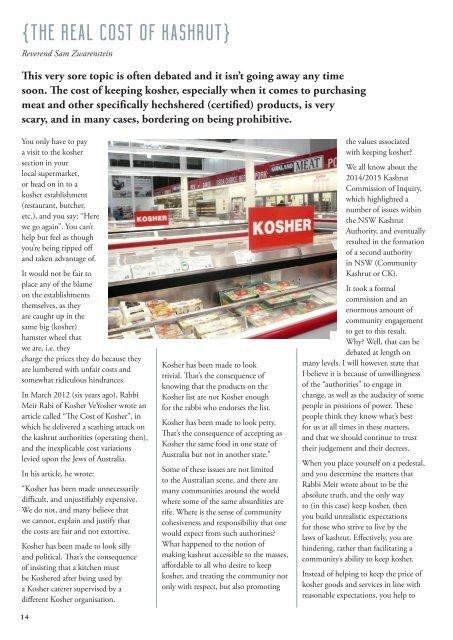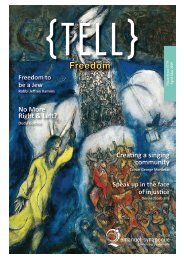Create successful ePaper yourself
Turn your PDF publications into a flip-book with our unique Google optimized e-Paper software.
{THE REAL COST OF KASHRUT}<br />
Reverend Sam Zwarenstein<br />
This very sore topic is often debated and it isn’t going away any time<br />
soon. The cost of keeping kosher, especially when it comes to purchasing<br />
meat and other specifically hechshered (certified) products, is very<br />
scary, and in many cases, bordering on being prohibitive.<br />
You only have to pay<br />
a visit to the kosher<br />
section in your<br />
local supermarket,<br />
or head on in to a<br />
kosher establishment<br />
(restaurant, butcher,<br />
etc.), and you say; “Here<br />
we go again”. You can’t<br />
help but feel as though<br />
you’re being ripped off<br />
and taken advantage of.<br />
It would not be fair to<br />
place any of the blame<br />
on the establishments<br />
themselves, as they<br />
are caught up in the<br />
same big (kosher)<br />
hamster wheel that<br />
we are, i.e. they<br />
charge the prices they do because they<br />
are lumbered with unfair costs and<br />
somewhat ridiculous hindrances.<br />
In March 2012 (six years ago), Rabbi<br />
Meir Rabi of Kosher VeYosher wrote an<br />
article called “The Cost of Kosher”, in<br />
which he delivered a scathing attack on<br />
the kashrut authorities (operating then),<br />
and the inexplicable cost variations<br />
levied upon the Jews of Australia.<br />
In his article, he wrote:<br />
“Kosher has been made unnecessarily<br />
difficult, and unjustifiably expensive.<br />
We do not, and many believe that<br />
we cannot, explain and justify that<br />
the costs are fair and not extortive.<br />
Kosher has been made to look silly<br />
and political. That’s the consequence<br />
of insisting that a kitchen must<br />
be Koshered after being used by<br />
a Kosher caterer supervised by a<br />
different Kosher organisation.<br />
14<br />
Kosher has been made to look<br />
trivial. That’s the consequence of<br />
knowing that the products on the<br />
Kosher list are not Kosher enough<br />
for the rabbi who endorses the list.<br />
Kosher has been made to look petty.<br />
That’s the consequence of accepting as<br />
Kosher the same food in one state of<br />
Australia but not in another state.”<br />
Some of these issues are not limited<br />
to the Australian scene, and there are<br />
many communities around the world<br />
where some of the same absurdities are<br />
rife. Where is the sense of community<br />
cohesiveness and responsibility that one<br />
would expect from such authorities?<br />
What happened to the notion of<br />
making kashrut accessible to the masses,<br />
affordable to all who desire to keep<br />
kosher, and treating the community not<br />
only with respect, but also promoting<br />
the values associated<br />
with keeping kosher?<br />
We all know about the<br />
2014/2015 Kashrut<br />
Commission of Inquiry,<br />
which highlighted a<br />
number of issues within<br />
the NSW Kashrut<br />
Authority, and eventually<br />
resulted in the formation<br />
of a second authority<br />
in NSW (Community<br />
Kashrut or CK).<br />
It took a formal<br />
commission and an<br />
enormous amount of<br />
community engagement<br />
to get to this result.<br />
Why? Well, that can be<br />
debated at length on<br />
many levels. I will however, state that<br />
I believe it is because of unwillingness<br />
of the “authorities” to engage in<br />
change, as well as the audacity of some<br />
people in positions of power. These<br />
people think they know what’s best<br />
for us at all times in these matters,<br />
and that we should continue to trust<br />
their judgement and their decrees.<br />
When you place yourself on a pedestal,<br />
and you determine the matters that<br />
Rabbi Meir wrote about to be the<br />
absolute truth, and the only way<br />
to (in this case) keep kosher, then<br />
you build unrealistic expectations<br />
for those who strive to live by the<br />
laws of kashrut. Effectively, you are<br />
hindering, rather than facilitating a<br />
community’s ability to keep kosher.<br />
Instead of helping to keep the price of<br />
kosher goods and services in line with<br />
reasonable expectations, you help to
















